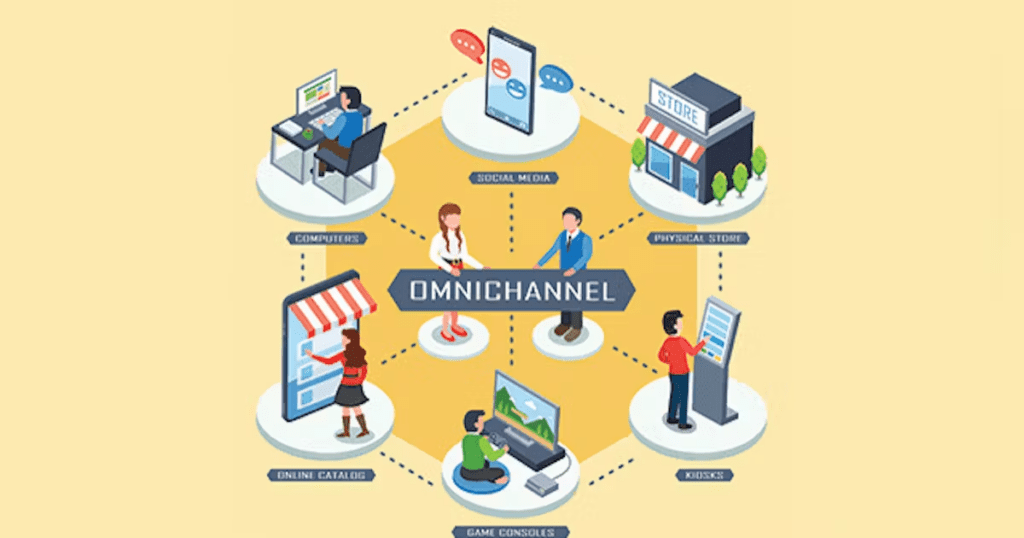
In the ever-evolving landscape of retail, where consumers seamlessly transition between online and offline channels, adopting effective strategies for omnichannel fulfillment has become imperative for businesses striving to meet customer expectations. Omnichannel fulfillment goes beyond the traditional retail model, integrating various sales channels into a unified and cohesive experience.
In this discussion, we will explore essential strategies aimed at optimizing omnichannel fulfillment.
What is omnichannel fulfillment?

Omnichannel fulfillment is a strategy in retail and supply chain management that focuses on providing a seamless and integrated shopping experience for customers across various channels, whether online or offline. The goal of omnichannel fulfillment is to enable customers to engage with a retailer or brand through multiple channels—such as physical stores, websites, mobile apps, social media, and more – while ensuring a consistent and cohesive experience.
Benefits of Omnichannel fulfillment
Omnichannel fulfillment offers several benefits for both retailers and customers by creating a seamless and integrated shopping experience across various channels. Here are some advantages:
Enhanced Customer Experience:
- Omnichannel fulfillment provides customers with a consistent and cohesive experience across all channels. Whether they are shopping online, in-store, or using a mobile app, customers can expect uniform product information, pricing, and promotions. This leads to higher customer satisfaction and loyalty.
Increased Convenience and Flexibility:
- Customers enjoy increased convenience and flexibility with omnichannel fulfillment. They can choose from various options such as in-store pickup, curbside delivery, home delivery, or shipping to an alternative location. This flexibility accommodates different customer preferences and offers a more convenient shopping process.
Optimized Inventory Management:
- By integrating inventory data across all channels in real-time, retailers can optimize their inventory management. This ensures that products are available where they are needed most, reducing the likelihood of stockouts and overstock situations. As a result, businesses can minimize holding costs and improve overall efficiency.
Improved Operational Efficiency:
- Omnichannel fulfillment streamlines the order management process. A centralized system that efficiently handles orders from various channels helps reduce errors, enhance accuracy, and speed up order fulfillment. This, in turn, leads to improved operational efficiency and cost-effectiveness.
Better Insights through Data Analytics:
- Omnichannel strategies generate valuable data on customer behavior, preferences, and trends across different channels. Retailers can leverage data analytics to gain insights into consumer patterns, optimize marketing strategies, and make informed decisions about inventory management and product offerings.
Competitive Advantage:
- Adopting omnichannel fulfillment provides a competitive edge in the retail landscape. Businesses that can seamlessly integrate online and offline channels are better positioned to meet the expectations of modern consumers. This adaptability is crucial in an environment where customer preferences and shopping habits continue to evolve.
Overall, omnichannel fulfillment not only improves the customer experience but also contributes to operational efficiency, inventory optimization, and a competitive advantage in the market. As consumers increasingly expect a unified and convenient shopping journey, retailers embracing omnichannel strategies are better positioned to meet these expectations and thrive in the evolving retail landscape.
Challenges of fulfillment with omnichannel retail

While omnichannel retail fulfillment offers numerous benefits, it also comes with several challenges that businesses must navigate to ensure success. Here are some common challenges associated with omnichannel fulfillment:
Inventory Visibility and Accuracy:
- Maintaining accurate and real-time inventory visibility across various channels is a significant challenge. Inaccurate inventory data can lead to overselling, stockouts, and disappointed customers. Ensuring synchronization of inventory data across multiple systems and platforms is crucial for effective omnichannel fulfillment.
Order Management Complexity:
- With orders coming from different channels and fulfillment methods (in-store pickup, home delivery, etc.), managing the entire order fulfillment process becomes more complex. Coordinating and efficiently processing orders while maintaining accuracy can be challenging without a robust order management system.
Integration of Technology Platforms:
- Integrating various technology platforms, including point-of-sale (POS) systems, e-commerce platforms, customer relationship management (CRM) systems, and warehouse management systems (WMS), is essential for seamless omnichannel fulfillment. Ensuring compatibility and smooth communication between these systems can be a technological challenge.
Supply Chain Adaptability:
- Adapting the supply chain to meet the demands of omnichannel fulfillment requires flexibility. Retailers need to be agile in responding to changes in demand, fluctuations in order volumes, and varying fulfillment locations. Achieving this adaptability in the supply chain may require reevaluating distribution networks and logistics strategies.
Consistent Customer Experience:
- Maintaining a consistent and high-quality customer experience across all channels is challenging. From online platforms to brick-and-mortar stores, customers expect a seamless and unified experience. Any inconsistencies in product information, pricing, or service quality can impact customer satisfaction and brand perception negatively.
Last-Mile Delivery Challenges:
- The final stage of delivery, commonly referred to as the last mile, can present challenges. Coordinating timely and cost-effective last-mile delivery, especially in urban areas, can be complex. Retailers need to optimize routes, manage delivery windows, and address customer expectations for fast and reliable delivery.
Overcoming these challenges requires a strategic approach, investment in technology solutions, and a commitment to optimizing processes. Businesses that successfully navigate these obstacles can create a competitive advantage by offering a seamless omnichannel experience for their customers.
Strategies for omnichannel fulfillment

Implementing effective strategies for omnichannel fulfillment is essential for businesses looking to provide a seamless and integrated shopping experience across various channels. Here are three key strategies:
Integrated Inventory Management:
- Establish a centralized and real-time inventory management system that integrates seamlessly with all sales channels. This ensures accurate and up-to-date visibility of stock levels across stores, warehouses, and online platforms. Integrated inventory management helps prevent stockouts, minimize overstock situations, and enables efficient order fulfillment.
Unified Order Management System:
- Implement a unified order management system that can efficiently process orders originating from different channels. This system should enable businesses to manage orders, track shipments, and coordinate fulfillment processes in a centralized manner. A robust order management system helps streamline workflows, reduce errors, and improve overall efficiency.
Flexible Fulfillment Options:
- Offer a variety of fulfillment options to cater to diverse customer preferences. This can include in-store pickup, curbside delivery, home delivery, or shipping to alternative locations. Providing flexibility in fulfillment options enhances customer convenience and allows them to choose the method that best suits their needs. This strategy also helps optimize resources and reduce the strain on specific fulfillment channels.
Implementing these strategies requires a comprehensive approach and a commitment to integrating technology, processes, and customer experiences. By focusing on integrated inventory management, unified order processing, flexible fulfillment options, technology integration, and data analytics, businesses can enhance their omnichannel fulfillment capabilities and provide a superior and consistent shopping experience for customers across all channels.